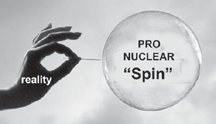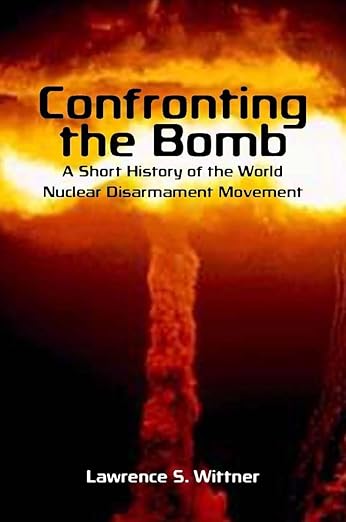A response to Kallenborn: Why realism requires that nuclear weapons be abolished

By Ward Hayes Wilson | January 17, 2024, https://thebulletin.org/2024/01/a-response-to-kallenborn-why-realism-requires-that-nuclear-weapons-be-abolished/
In a recent piece in the Bulletin (“Why a nuclear weapons ban would threaten, not save, humanity”), Zachary Kallenborn argued that a ban on nuclear weapons would create serious risks, including unrestrained great power war and a hindering of global cooperation. He asserted that continuing to maintain small nuclear weapons arsenals for the foreseeable future is sensible.
What is troubling about this assertion is not so much that Mr. Kallenborn is wrong, but that he seems to have strayed from reality. Mistakes in a discussion about nuclear weapons policy matter because roughly 4.2 billion people depend on those policies for their safety and survival. With so much at stake, the discussion about nuclear weapons demands the highest levels of seriousness and an unflinching insistence on realism. Mr. Kallenborn has missed that mark in at least one important regard.
Nuclear weapons prevent all-out war? Kallenborn writes, “Nuclear weapons place a cap on how bad great power conflict can become and may deter the emergence and escalation of great power war.” In the world of nuclear weapons advocates, this is a common claim, viz. that nuclear weapons prevent large-scale existential wars similar to World War II. For example, John Lewis Gaddis a highly regarded historian of the Cold War, puts it this way: “As the means of fighting great wars became exponentially more devastating, the likelihood of such wars diminished, and ultimately disappeared altogether.”[1] In other words, “great” wars have disappeared altogether, and nuclear weapons are the reason.
This claim is essential for those who wish to keep nuclear weapons. After all, if nuclear weapons can stop World War II-type wars, then it is safe—even necessary—to keep them. If, on the other hand, they can’t, then all-out wars are more likely (because people wrongly think that nothing can go wrong as long as nuclear weapons are present). And when one occurs, the use of nuclear weapons is almost inevitable.
Unfortunately, the faith in the peace-inducing powers of nuclear weapons is wishful thinking. Wars are decided by human beings, and as the history of our civilization demonstrates—Winston Churchill once called it “the dark lamentable catalog of human crime”—human beings have deep-rooted urges to make war. It is not pleasant to insist on this portrayal of human nature, but the stakes require that we be brutally honest with ourselves. We have been fighting wars with dogged persistence for at least 6,000 years. As President John F. Kennedy put it, “[T]he human race’s history, unfortunately, has been a good deal more war than peace.”[2] Every era of history and region of the world has experienced war with disheartening regularity. There are sometimes pauses and respites—sometimes for even a hundred years—but the lust for war always reemerges.
American philosopher William James explained the persistence of war this way, “Our ancestors have bred pugnacity into our bone and marrow, and thousands of years of peace won’t breed it out of us.”[3] War is a tenacious part of our behavior. If humans were to suddenly give up fighting wars, it would be a monumental change—a revolution in human behavior. Losing our taste for war would be to surrender something central to our natures—like renouncing our predisposition for religion, our love of beauty, or our tendency to overeat.
There’s no doubt that the risk of using nuclear weapons can restrain thoughts of war … sometimes. But can the “magic” of nuclear weapons dissuade us forever? Nothing else has. The hopeful (and somewhat naive) belief that nuclear weapons will always prevent all-out wars ignores one important fact: The evidence that supports this claim—the last 78 years—amounts to only 1.3 percent of the evidence. The other 5,928 years tell a different story.
Let’s get real. The claim that nuclear weapons have somehow permanently suppressed the heretofore unquenchable desire for war is not a realist position. Typically, it is idealists who optimistically say that we can change the world by simply changing our hearts. Idealists believe that changing human nature overnight is possible. For example, in the 1960s, gentle, pot-smoking hippies believed that a new society could be created, a utopian world where people would live in communes and value love above all other things. And with this new emphasis on love, there would naturally come a world filled with peace. And we could all hold hands and sing.
If you stop and think about it, the belief that nuclear weapons have changed human nature—what Kallenborn asserts—is essentially the same claim those hippies made. Nuclear believers say that the urge to make savage war has at last been overcome. They say we can now live in peace forever. Our darker, primitive natures will never again overwhelm our sensible, rational brains. There will be no more all-out wars. And they say this utopia of peace has already arrived (just without the singing). But rather than the power of love, it is a tool—a piece of technology—that has wrought this magical transformation.
Sadly, nuclear weapons have not transformed our warlike natures into calm and peaceful ones. Unbridled war, fought with savage abandon, is still likely, perhaps even inevitable. If you doubt that anger and violence are stalking the world, read some headlines. Around the world are sudden fires of passion that leap up first here, then there. War is raging in Europe and the Middle East. With so much hatred around as fuel, is there much doubt that a war that engulfs many nations and many peoples is far off? If you don’t think so, at least some of your neighbors do. An International Red Cross survey asked millennials in 2019 if they thought a worldwide war similar to World War II would happen in their lifetimes. More than 58 percent of respondents in the United States said yes.[4]
The belief that large-scale war has been banished forever by nuclear weapons is nothing more than a dangerous fantasy. All the evidence of history and everything we know about ourselves tells us that our warlike natures cannot change overnight. (That is the sound of genuine realism talking.)
Claims that we can change human nature are unsurprising in the mouths of gentle, pot-smoking hippies. On the lips of nuclear weapons proponents, they are realist heresy. The fact that nuclear weapons advocates can call themselves realists and at the same time claim that nuclear weapons make all-out wars impossible shows that they do not understand the assumptions that underlie their own position. Their “realism” is nothing of the kind.
The problem with relying on nuclear deterrence is that if it can’t be perfect—and perfect for all time—then it is too dangerous to rely on. Who’s to say that nuclear deterrence isn’t like a pressure cooker—able to hold off savage wars for a time, but when the top blows off at last, the destruction will be all the more far-reaching because it was held in for so long? Because of our primitive, warlike natures, nuclear weapons have to go. There are no safe hands for nuclear weapons. That is a reality that we all ignore at our own peril.
Editor’s note: Ward Hayes Wilson is the author, most recently, of It Is Possible: A Future Without Nuclear Weapons. The arguments here are based in part on chapter one of that book.
References: ……………………….
No comments yet.
-
Archives
- February 2026 (105)
- January 2026 (308)
- December 2025 (358)
- November 2025 (359)
- October 2025 (376)
- September 2025 (258)
- August 2025 (319)
- July 2025 (230)
- June 2025 (348)
- May 2025 (261)
- April 2025 (305)
- March 2025 (319)
-
Categories
- 1
- 1 NUCLEAR ISSUES
- business and costs
- climate change
- culture and arts
- ENERGY
- environment
- health
- history
- indigenous issues
- Legal
- marketing of nuclear
- media
- opposition to nuclear
- PERSONAL STORIES
- politics
- politics international
- Religion and ethics
- safety
- secrets,lies and civil liberties
- spinbuster
- technology
- Uranium
- wastes
- weapons and war
- Women
- 2 WORLD
- ACTION
- AFRICA
- Atrocities
- AUSTRALIA
- Christina's notes
- Christina's themes
- culture and arts
- Events
- Fuk 2022
- Fuk 2023
- Fukushima 2017
- Fukushima 2018
- fukushima 2019
- Fukushima 2020
- Fukushima 2021
- general
- global warming
- Humour (God we need it)
- Nuclear
- RARE EARTHS
- Reference
- resources – print
- Resources -audiovicual
- Weekly Newsletter
- World
- World Nuclear
- YouTube
-
RSS
Entries RSS
Comments RSS


Leave a comment